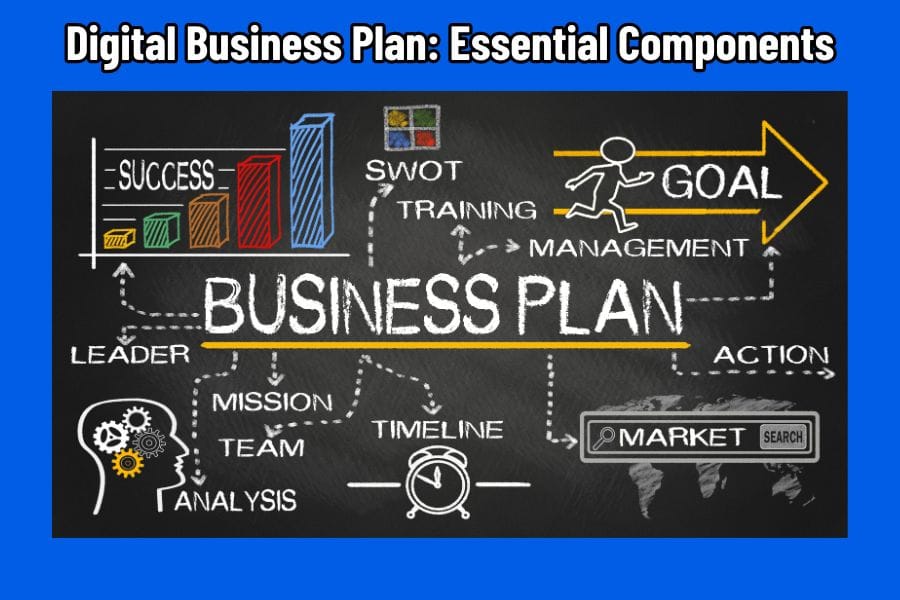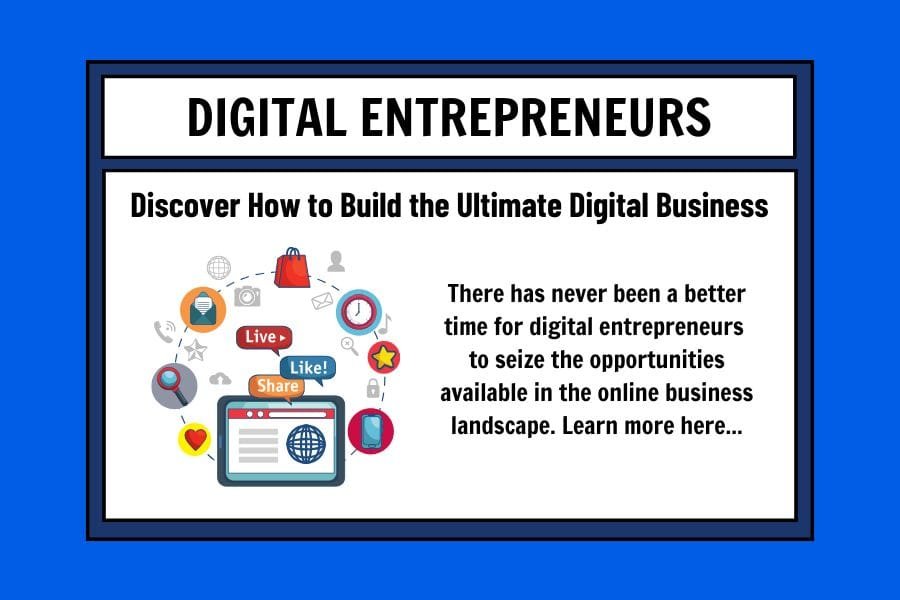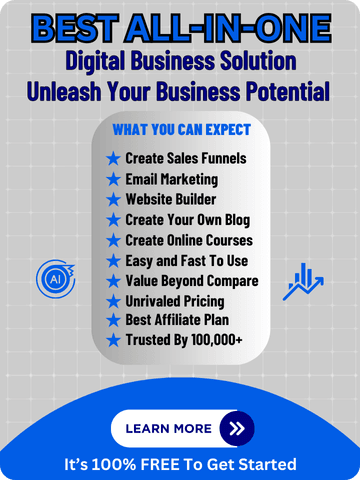Digital entrepreneurs: Learn how to build the ultimate digital business including tips on idea validation, marketing strategies, scaling, and leveraging AI tools.
Understanding Digital Entrepreneurship
What is Digital Entrepreneurship?
Digital entrepreneurship is the process of starting and running a business online, leveraging digital technologies to create, market, and deliver products or services. Unlike traditional businesses that rely on physical locations and face-to-face interactions, digital entrepreneurs build their ventures in the virtual space, utilizing websites, social media, and online tools. Whether you’re launching a blog, developing a digital course, or offering freelance services, digital entrepreneurship offers endless opportunities to create value and scale faster than ever before.
What are the Differences Between Traditional and Digital Entrepreneurship?
The biggest distinction between traditional and digital entrepreneurship lies in how products and services are created and delivered. Traditional entrepreneurs often operate in physical locations, requiring significant upfront costs for inventory, space, and staffing. In contrast, digital entrepreneurs can launch their business with lower costs, often from the comfort of home, using digital tools and automation to run operations. Moreover, digital solopreneurs can tap into a global audience with a few clicks, something that is challenging for most traditional businesses.
Why You Should Consider Digital Entrepreneurship
Today, digital entrepreneurship presents a wealth of opportunities that are hard to ignore. The low cost of starting an online business allows you to launch without the hefty capital outlay traditionally required. New technologies, particularly AI enhancements, simplify daily operations, from customer service to marketing automation, making it easier to manage and scale your business.
Plus, the global reach of the internet means you aren’t confined to local markets—you can sell your products or services to customers around the world. These factors make digital solopreneur ventures incredibly attractive for anyone looking to build a flexible, scalable, and highly profitable business in today’s economy.
With an understanding of what digital entrepreneurship is and why it’s so attractive, let’s dive into how to identify profitable digital business ideas that can set you on the right path.
How to Identify Profitable Digital Business Ideas

How to Evaluate in a Digital Business Idea?
When you evaluate a digital business idea, it’s crucial to consider several key elements that will determine your success. First, assess the market demand—does your idea solve a real problem for a specific group of people? Then, examine the competition. Are there too many players in the market, or is there a gap you can fill? Finally, factor in your ability to scale and automate. As a digital entrepreneur, you’ll want an idea that can grow without requiring a lot of extra effort, using digital tools to automate as much as possible within the digital business landscape.
How Do You Validate a Digital Business Idea?
Before pouring time and money into your business, it’s vital to validate your idea. Start by conducting market research to see if there’s genuine interest in your product or service. Use surveys, run pre-launch campaigns, or set up a simple landing page to gauge interest. If people are signing up or showing interest, that’s a good sign. Another strategy is to offer a small-scale version of your product to a test audience. This will allow you to refine your idea based on feedback and ensure it resonates with your target market—saving you from launching a business that doesn’t fit the needs of your audience.
What Are the Best Tools to Find Profitable Digital Business Ideas?
There are many tools you can use, here are some popular choices:
- Google Trends: Helps you analyze what people are searching for online, giving you insight into market demand and emerging trends.
- AnswerThePublic: Generates questions and search queries people are asking related to your niche, helping you identify gaps in the market.
- SEMrush: A robust SEO tool that provides keyword data, competition analysis, and trending topics, allowing you to discover new opportunities in the digital business landscape.
- BuzzSumo: Shows you what content is performing best in your industry, providing insights on what’s gaining traction and what’s falling flat.
How to Use Trends to Identify Digital Business Opportunities?
Staying ahead of the curve is key to succeeding as a digital entrepreneur. To identify lucrative digital business opportunities, you need to keep a close eye on emerging trends. Use tools like Google Trends or industry-specific reports to spot rising interest in particular topics.
For example, if you notice a growing demand for sustainable products or AI-powered solutions, that could be your signal to dive in. Keep track of social media conversations, forums, and digital publications in your niche to see what’s gaining attention. By leveraging trends early, you can position your business to capture a share of the market before it becomes saturated.
Now that you understand how to identify a profitable business idea, it’s time to explore specific examples of digital businesses you can start today.
Top Digital Business Ideas to Consider

If you have experience or expertise in any of the following business ideas you can fast start your online presence.
Blogging
Blogging is an excellent way for digital entrepreneurs to establish an online presence and generate income. By creating valuable content in a niche you’re passionate about, you can attract a loyal audience. Monetization options include displaying ads (e.g., Google AdSense), promoting affiliate products, offering paid sponsorships, or even selling your own digital products. With consistent effort and the right SEO strategies, blogging can turn into a profitable venture that grows passively over time.
Dropshipping
Dropshipping offers a low-risk way for digital entrepreneurs to run an eCommerce store without the hassle of managing inventory. Using platforms like Shopify or WooCommerce, you can sell products directly from suppliers to customers. This business model allows you to focus on marketing and scaling while the supplier handles inventory, packaging, and shipping. With minimal upfront costs, it’s a great option for testing the waters in the online retail space. You can easily expand this model by adding your own products when time and funding permit.
Digital Courses and Tutoring
If you have expertise in a particular field, creating digital courses or offering tutoring can be a highly profitable venture. Platforms like systeme.io, Udemy, or Teachable allow you to create and sell courses on topics you excel at. Alternatively, personalized tutoring sessions in areas like language learning, coding, or digital marketing can be offered through platforms or your own website. The scalability of digital courses makes them an ideal revenue stream for digital entrepreneurs.
Virtual Assistant Services
Providing virtual assistant services is another simple and cost-effective way to break into the online business world. You can offer administrative support, such as managing emails, scheduling, social media, or customer service, for busy entrepreneurs or businesses. This flexible role allows you to work remotely and build a client base quickly, making it a popular choice for those who want to offer valuable services with minimal costs and without a heavy time commitment.
Freelance: Graphic Design or Content Writing
Freelancing as a graphic designer or content writer can be highly lucrative, especially with platforms like Fiverr and Upwork making it easier to find clients. If you have creative skills or writing expertise, you can offer these services to businesses or individuals who need high-quality work. Building a portfolio and reputation online can lead to repeat clients and a steady stream of income for digital entrepreneurs. Low cost entry.
Social Media Consultancy
Businesses today rely heavily on their online presence, and that’s where social media consultancy comes into play. You can help brands craft their social media strategies, create engaging content, and manage their accounts to build visibility and grow their following. This business model is profitable because many companies lack the time or expertise to navigate the ever-changing social media landscape, so they’re willing to pay for expert guidance. AI tools can help create content and manage the process again with low upfront costs.
SEO Consulting
SEO consulting is another profitable business idea where you assist companies in boosting their search engine rankings. By analyzing websites and implementing SEO best practices—such as keyword research, content optimization, and backlinking strategies—you can help businesses drive more traffic to their sites. Given the importance of visibility online, many businesses are willing to invest in SEO consulting to improve their digital performance.
App Development
App development has become accessible to digital entrepreneurs thanks to no-code tools like Bubble or Glide. With these platforms, you can create custom apps for businesses or consumers, catering to specific needs without needing advanced coding knowledge. Whether you’re developing apps for content creation, productivity, health, or entertainment, the demand for unique, user-friendly applications is high, making this a lucrative and creative opportunity.
Affiliate Marketing
Affiliate marketing allows you to earn commissions by promoting products to your email list, on your blog, website, or social media channels. As an affiliate, you recommend products to your audience, and when they make a purchase through your link, you earn a percentage of the sale. This is an attractive business model because you can get started right away on an affiliate marketing platform and you don’t need to create or stock products. With the right audience and marketing tools, digital entrepreneurs can generate a steady stream of passive income.
Online Coaching or Consulting
Online coaching or consulting is a highly flexible and profitable business model, perfect for those who have expertise in fields such as business, fitness, finance, life coaching, etc. You can offer personalized, virtual sessions in areas you’re passionate about or experienced in. This market is rapidly growing, with individuals and businesses constantly seeking guidance in specialized areas. Whether it’s one-on-one coaching or group sessions, the potential to scale and earn is substantial in the digital coaching space.
Now that you’ve seen a variety of business ideas that can be very profitable, let’s dive into the next crucial step—how to conduct effective audience research to ensure your success.
How To Conduct Audience Research
How Can I Identify My Target Audience, Key Steps?
Identifying your target audience is one of the most crucial steps for digital entrepreneurs. Start by defining your niche—who exactly are you trying to serve? This involves understanding the problem your product or service solves and who will benefit the most. Next, create detailed customer personas. These are fictional representations of your ideal customers, including demographics, behaviors, and pain points.
Once you know your audience, engage in audience research by analyzing where these potential customers spend their time online, what content they consume, and how they engage with brands. This will help you refine your marketing strategy and ensure your business resonates with the right audience.
What Tools Are Best for Collecting and Analyzing Demographic Data?
Here are some popular tools every online business owner should consider:
- Google Analytics: Provides detailed insights into your website visitors, including their age, location, interests, and online behavior.
- Facebook Audience Insights: Offers demographic data and behavior patterns of your Facebook audience, including pages they like, their interests, and purchasing habits.
- SurveyMonkey: Allows you to create and distribute surveys to gather first-hand data about your audience’s needs, preferences, and challenges.
- SEMrush: A powerful SEO tool that also provides competitive insights and audience data to help you understand your market better.
- BuzzSumo: Helps identify trending content and influencers within your niche, giving you a broader view of what appeals to your target audience.
What are Common Pitfalls in Audience Research?
One of the biggest pitfalls in audience research is making assumptions without data to back them up. Too many digital entrepreneurs rely on gut feeling instead of solid research, which can lead to misjudging the needs of their audience. Another common mistake is failing to niche down enough, which leads to targeting too broad of an audience.
Additionally, relying solely on one type of data source, like social media insights, without cross-referencing other analytics, can give a skewed view of your audience.
How to Avoid Pitfalls in Audience Research?
To avoid these pitfalls, start by using data-driven tools like Google Analytics, SEMrush, Hotjar, and SurveyMonkey to collect real insights instead of relying on assumptions. Create specific and well-researched customer personas to narrow down your target market. This ensures your messaging is highly relevant. Diversify your research by pulling data from multiple sources—social media, surveys, website analytics, and industry reports.
Finally, continuously update your audience research as your business grows. The needs and behaviors of your target audience may evolve, and staying updated keeps you in tune with their preferences.
Now that you know how to research your audience effectively, let’s explore how to create products that deliver real solutions and drive your business forward.
How To Create Solution Driven Products

How to Develop Digital Products and Services?
As digital entrepreneurs, the foundation of your success lies in creating products or services that solve real problems for your audience. Before diving into development, it’s critical to understand the pain points or challenges your potential customers face. Conduct thorough research and engage with your audience to determine what solutions they’re searching for.
When your offerings are focused on being solution-driven products, you’re not just selling a product—you’re offering a valuable fix to a pressing issue. This approach not only builds trust but also opens the door to financial success, as customers are willing to pay for solutions that genuinely improve their lives or businesses.
Product or Service Must Be High Quality, User-Friendly, and Supported
A high-quality product alone won’t guarantee success unless it’s paired with a seamless user experience and strong customer support. As digital entrepreneurs, your digital product or service must be intuitive and easy to use. From the moment a user interacts with it, they should feel confident navigating its features.
In addition to design and functionality, don’t underestimate the power of ongoing support. Whether it’s through tutorials, live chat, or detailed FAQs, providing exceptional customer support will build long-term loyalty and prevent churn. And, remember, always focus on providing solution driven products or services..
Now that you understand the importance of creating solution-driven products, let’s dive into how leveraging technology, including AI, can take your digital business to the next level.
How to Leverage Technology and Enhance with AI
Essential Tech Tools
To thrive as digital entrepreneurs, you need the right tech tools to streamline your operations and increase efficiency. Let’s start with website platforms like WordPress or Wix, which are vital for building your online presence. Next, consider email communication tools such as MailChimp or ConvertKit to help you manage and nurture your leads. A solid CRM (Customer Relationship Management) system like HubSpot or Zoho is also essential for keeping track of customer interactions and managing sales pipelines.
If you’re looking to create and sell courses, platforms like Teachable or Thinkific are excellent options. However, all-in-one platforms like systeme.io can simplify everything, from website building and course creation to email marketing and automation. This makes them an ideal choice for entrepreneurs who are just starting out or looking to grow their digital business efficiently without juggling multiple tools.
AI Integration
AI is revolutionizing the way digital entrepreneurs run their businesses, making it easier to scale and optimize operations. With AI, you can automate content creation using tools like chatGPT, Jasper or Copy.ai, saving you time and ensuring consistent quality. For customer service, AI-powered chatbots can handle common queries around the clock, improving customer satisfaction and freeing you up to focus on more strategic tasks.
AI can also enhance data analysis, helping you identify patterns, predict customer behavior, and help you make informed decisions to optimize your marketing and sales strategies. In short, knowing how to leverage technology like AI can be a game changer, turning complex tasks into simple, automated processes.
With the power of tech and AI at your disposal, it’s time to craft a business plan that lays out your path to success. Let’s dive into how to build that roadmap.
How to Craft a Business Plan for your Digital Business

Digital Business Plan: Essential Components
Creating a comprehensive business plan is a must for digital entrepreneurs. It’s your roadmap, outlining how you will take your idea and turn it into a profitable venture. A strong digital business plan includes several key components: an executive summary, business model, market research, product or service offerings, technology infrastructure, revenue model, and financial projections. A SWOT (Strengths, Weaknesses, Opportunities, and Threats) analysis can also help you assess what your company does best now and develop a long-term strategy for the future. All of these elements work together to provide clarity on your goals, strategies, and how you’ll measure success.
A solid business plan keeps you focused, aligns your efforts, and gives potential investors or partners confidence in your vision. You can learn how to write a business plan easily and quickly by using the [SBA] Small Business Administration template.
Business Plan: Setting Goals and Objectives
Setting realistic goals is crucial for the growth and sustainability of your business. As a digital entrepreneur, you need to focus on short-term objectives that build momentum and long-term goals that keep you scaling. Start with SMART goals—specific, measurable, achievable, relevant, and time-bound. For example, if your goal is to increase website traffic, set a clear target like “grow website traffic by 20% in the next three months through content marketing and SEO efforts.” These kinds of goals keep you accountable and ensure you’re always moving forward with intention.
Business Plan: Crafting a Marketing Strategy
A winning marketing strategy is essential to reaching and engaging your target audience. Digital entrepreneurs should focus on techniques like SEO to improve search rankings, content marketing to provide value and build authority, social media marketing to engage directly with customers, and email campaigns to nurture leads and convert them into paying customers. Incorporate all these strategies into your digital business plan to ensure you’re covering all touchpoints. By focusing on these key areas, you’ll be able to build a loyal audience and drive consistent traffic and sales to your business.
Business Plan: How to Measure Success
Measuring your success is just as important as setting goals. You need to know what’s working and what isn’t to refine your strategies. Key metrics like website traffic, conversion rates, customer acquisition costs, and return on investment (ROI) are essential indicators of your business health. Tools like Google Analytics, HubSpot, and SEMrush can provide valuable insights into your marketing effectiveness. By continuously tracking these metrics, you can make data-driven decisions to optimize your strategy and grow your business sustainably.
Now that you understand how to craft a business plan, let’s explore how to scale your digital business to new heights.
How to Scale Your Digital Business
Growth Strategies
Scaling your digital business is all about increasing your reach and maximizing profitability without overextending your resources. Digital entrepreneurs can expand by introducing new product lines that complement your existing offerings, allowing you to cater to more diverse customer needs. Alternatively, you can explore entering global markets by leveraging digital platforms, social media, and localized content to tap into international audiences.
Automation and outsourcing are also powerful tools that enable you to scale operations while keeping costs under control. By implementing these strategies, you’ll position your business for sustainable growth and long-term success.
Building Partnerships
Strategic partnerships can significantly amplify your business’s growth by allowing you to tap into wider audiences and share resources. Partnering with other businesses or influencers in your niche can help you reach potential customers you wouldn’t have otherwise. Collaborations can come in many forms, from co-marketing campaigns to product bundles or even guest blog exchanges.
For digital entrepreneurs, forming these relationships can be the key to unlocking new markets and boosting credibility. When you collaborate, both parties benefit from shared audiences and a stronger presence in the digital space.
Affiliate Marketing
Affiliate marketing is an excellent way to add an additional revenue stream without increasing overhead costs. By promoting other people’s products that complement or relate to your own, you can earn commissions on sales generated through your unique affiliate links. This strategy is particularly effective for digital entrepreneurs who are already building a strong online presence.
Whether it’s recommending tools, software, or products you genuinely believe in, affiliate marketing allows you to scale up marketing efforts while monetizing your audience in a way that feels organic and mutually beneficial.
With these strategies for scaling your business in place, it’s time to explore how you can take advantage of the current digital landscape and seize the opportunities waiting for you.
Closing: Why Now is the Best Time to Start A Digital Business

Opportunities in the Digital Business Landscape
There has never been a better time for digital entrepreneurs to seize the opportunities available in the online business world. Recent statistics for example, show that global eCommerce sales are projected to reach $6.3 trillion by 2024, and more than 60% of the global population is now online. The rise of remote work and the increasing demand for digital services have created an ideal environment for online businesses to thrive.
Whether you’re starting a blog, launching a digital course, or offering freelance services, the digital landscape is booming, and the potential for growth is enormous. With the right strategy, you can turn these trends into real profits.
The Role of AI, and Other Digital Tools
The rise of AI and digital tools have revolutionized the way digital entrepreneurs start and manage their businesses. From content creation and customer service to marketing automation and data analysis, AI is streamlining processes and cutting costs. Tools like chatGPT and Jasper can help you generate high-quality content in minutes, while chatbots handle customer inquiries 24/7, allowing you to focus on growth.
Furthermore, platforms like systeme.io provide all-in-one solutions for building websites, sales funnels, and managing email marketing. These cutting-edge tools make it easier than ever to start a digital business and scale it efficiently, even with limited resources.
What to Do Now?
Okay, digital enetrepreneurs, now that you’re equipped with the knowledge and tools to succeed, it’s time to take action. First, conduct thorough research and finalize your business plan. Identify your niche, define your target audience, and outline your goals. Then, explore all-in-one online marketing platforms like Systeme, which provide everything you need to launch and grow your business—from creating sales funnels and websites to automating your email campaigns. And the best part? It’s 100% free to get started, giving you access to cutting-edge digital tools without the upfront cost.
The digital business world is waiting for you to take the plunge—why wait? Let’s get started today!
FAQs: Digital Entrepreneurs
What are the first steps to becoming a digital entrepreneur?
The first steps to becoming a digital entrepreneur include identifying a profitable niche, conducting thorough audience research, and developing a solid business plan. You’ll also want to select the right digital tools, such as website platforms, email marketing software, and CRM systems, to streamline your operations and start building your online presence.
How much initial investment is required to start a digital business?
One of the advantages for digital entrepreneurs is the relatively low startup cost. Depending on the business model, you can start with as little as a few hundred dollars for website hosting, domain registration, and essential tools. Using all-in-one platforms like systeme.io, which offer free tiers, can help reduce costs even further while providing everything you need to run your digital business.
What are the most common challenges digital entrepreneurs face?
Some of the most common challenges include finding the right niche, attracting and retaining customers, managing time effectively, and keeping up with changing technologies. Many digital entrepreneurs also struggle with scaling their business without sacrificing quality. However, by leveraging automation, AI tools, and data-driven decision-making, you can now overcome these obstacles more easily.
How can digital entrepreneurs use AI to improve their businesses?
AI can help digital entrepreneurs by automating repetitive tasks, such as customer service through chatbots, content generation, and data analysis. Tools like Jasper for content creation and AI-powered CRM systems can save you time, allowing you to focus on strategy and growth. AI also helps with personalized marketing, ensuring that your messaging is more relevant to your target audience.
How long does it take to see success in a digital business?
The timeline for success varies depending on your business model, niche, and marketing strategy. For most digital entrepreneurs, it can take anywhere from six months to a few years to build significant momentum. Consistency in content creation, marketing, and audience engagement is key to speeding up this process. Tracking key performance metrics and refining your strategies will also help accelerate your success.
What’s the best way to scale a digital business?
To scale your digital business, consider expanding your product or service offerings, entering new markets, and automating processes wherever possible. Building partnerships and utilizing affiliate marketing can also help reach wider audiences without increasing overhead. Digital entrepreneurs should focus on creating scalable systems and outsourcing tasks to focus on higher-level growth strategies.
All-In-One Marketing Platform for Digital Entrepreneurs: [JOIN HERE FOR FREE]





